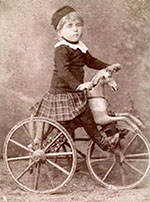
WOODEN WHEELS: In 1872, Claude Monet painted a portrait of his son Jean on his horse tricycle. The example owned by the Monet family had wooden wheels, similar to adult velocipedes that became popular in France in the 1860s.
METAL WHEELS: The next development of this popular French toy was the fitting of metal rims without tyres as seen on the original tricycle featured here.
SOLID RUBBER TYRES: Some makers fitted solid rubber tyres to their children’s tricycles with metal wheels before the end of the century; I’ve seen them advertised as an option in an 1895 Gamage catalogue. Solid rubber tyres were not new – Michaux & Cie fitted them to their adult velocipedes in 1868.
FRENCH v ENGLISH STYLE: The English juvenile horse tricycle design usually had a handlebar vertically mounted through the horse head or neck, and pedals in the front wheel – velocipede style. The most common early French design was chain driven and motivated by handles horizontally mounted through the horse’s head.


1890s French Juvenile Horse Tricycle
Handle Operated; chain to rear Axle
14″ Rear wheels; 12″ front wheel
LENGTH: 28″
WIDTH: 16″
HEIGHT: 24″
(Now sold)

This is the most common design of early French horse tricycle. It’s operated by handles connected by chain to the rear axle.
Many modern replicas have been made in Eastern Europe and Asia. Many of the forgeries are aged to try to disguise their modernity, and are passed off by unscrupulous auctioneers and antique shops as original. You can often tell the difference if they have welded parts, more modern fittings or modern screws. But sometimes it can be confusing, as originals have often been repaired over the years.
This one is in lovely original unrestored condition. I’ve photographed it in fine detail to help us discern authentic examples.













































1890s HORSE TRICYCLE: UNDERSIDE






































































